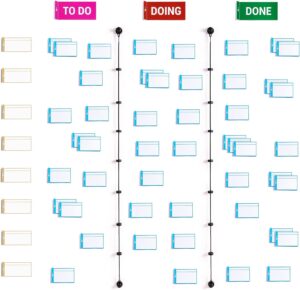In this article, we will explore how daily stand-ups in SCRUM can play a crucial role in fostering communication skills among children. By engaging in this collaborative and structured approach, children are given the opportunity to develop crucial qualities such as integrity, responsibility, and graciousness, while also learning to accept and appreciate the differences of others. Additionally, these daily check-ins provide them with the tools they need to effectively navigate and thrive during challenging times. So, let’s delve into the ways in which daily stand-ups in SCRUM can have a positive impact on children’s communication skills.
Benefits of Daily Stand-ups in SCRUM
Daily stand-ups in SCRUM provide numerous benefits that contribute to personal and professional growth, especially when it comes to communication skills. By participating in these daily meetings, children can develop essential life skills that will benefit them throughout their lives. Let’s explore some specific ways in which daily stand-ups in SCRUM foster communication skills in children.
Improved Communication Skills
Enhanced Vocabulary
One of the key benefits of daily stand-ups in SCRUM is the opportunity for children to enhance their vocabulary. As they participate in these meetings, they will be exposed to a wide range of industry-specific terminology and concepts. This exposure to new words and ideas promotes vocabulary development and strengthens their ability to effectively communicate with others.
Active Listening
Daily stand-ups in SCRUM encourage active listening, which is a crucial skill in effective communication. Children learn to pay attention to their teammates’ updates and insights, allowing them to truly understand what is being said. By developing active listening skills, they can avoid misunderstandings and ensure that their own contributions are well-informed and relevant.
Expressing Ideas Clearly
In daily stand-ups, children have the opportunity to express their thoughts, ideas, and concerns in a clear and concise manner. By practising articulating their points, they learn to structure their thoughts, select appropriate words, and convey their message effectively. This skill will be invaluable in both personal and professional settings, as clear communication is essential for success.
Respecting Others’ Opinions
Participating in daily stand-ups in SCRUM teaches children the importance of respecting others’ opinions and perspectives. It provides a safe space where different viewpoints are encouraged and valued. By actively listening to their peers and considering alternative ideas, children learn to foster a collaborative and inclusive environment, creating a foundation for respectful communication.
Enhanced Collaboration
Teamwork and Cooperation
Daily stand-ups promote teamwork and cooperation among children. As they share their progress and challenges in these meetings, they develop a sense of collective responsibility and work towards common goals. Collaborating with their peers to achieve project milestones fosters a supportive and synergistic environment where ideas are freely exchanged, leading to innovative solutions.
Sharing Responsibilities
In SCRUM, each team member has specific responsibilities and tasks. Daily stand-ups enhance collaboration by providing a platform for children to share their responsibilities with the team. By openly communicating about their individual tasks, children gain insight into others’ roles and contributions. This sharing of responsibilities fosters a sense of unity and strengthens their ability to work collaboratively towards a common objective.
Effective Brainstorming
Daily stand-ups provide an excellent opportunity for children to engage in effective brainstorming sessions. As they share their progress and encounter challenges, the team collectively brainstorms possible solutions. This collaborative problem-solving approach encourages children to think critically, generate ideas, and engage in constructive discussions. Through these sessions, they learn to appreciate the value of diverse perspectives and develop innovative problem-solving skills.
Facilitating Open Discussions
Daily stand-ups in SCRUM foster an environment of open discussions, where every team member is encouraged to participate. This inclusive setting allows children to voice their ideas, concerns, and suggestions freely. By actively engaging in these discussions, they learn to contribute to a healthy and dynamic conversation, leading to better decision-making and a deeper understanding of various viewpoints.
Increased Accountability
Taking Ownership of Tasks
One of the fundamental principles of daily stand-ups in SCRUM is the emphasis on individual ownership of tasks. Children learn to take responsibility for their assigned work and ensure its completion within the agreed-upon timeframe. This accountability cultivates a strong work ethic and a sense of personal responsibility, both of which are essential for effective communication and achieving goals.
Setting and Achieving Goals
Daily stand-ups in SCRUM provide children with a platform to set and monitor their goals. By regularly sharing their progress and identifying potential obstacles, they can adjust their plans and strategies accordingly. This practice fosters a goal-oriented mindset and enables them to develop effective communication skills in conveying their progress and discussing any hurdles they may encounter.
Understanding the Impact of Actions
Participating in daily stand-ups helps children understand the impact of their actions on the overall project. As they share their updates, they gain insights into how their work contributes to the larger team’s goals. This understanding prompts them to communicate the significance of their tasks and outcomes more effectively, fostering a stronger sense of purpose and accountability.
Reporting Progress
Daily stand-ups in SCRUM provide an invaluable opportunity for children to report their progress transparently. By regularly sharing updates on their tasks, they develop the ability to provide concise and informative summaries. This reporting practice enhances their communication skills by teaching them how to present complex information in a clear and succinct manner.
Developing Problem-Solving Abilities
Identifying and Analyzing Problems
Daily stand-ups in SCRUM encourage children to identify and analyze problems they encounter while working on their tasks. This practice nurtures their problem-solving abilities by training them to recognize challenges promptly. By openly discussing these issues with their teammates, they gain valuable insights and perspectives that contribute to finding effective solutions.
Brainstorming Solutions
Once problems are identified, daily stand-ups provide children with a collaborative platform for brainstorming potential solutions. Working together with their team, they learn to generate a variety of ideas and evaluate their feasibility. This active participation in solution-oriented discussions strengthens their critical thinking skills and fosters their ability to find innovative approaches.
Evaluating Alternatives
Through daily stand-ups, children develop the skill of evaluating alternatives. As they consider different solutions proposed by their teammates, they learn to weigh the pros and cons of each option. This evaluation process hones their analytical abilities and enables them to make informed decisions, essential skills for effective problem-solving and effective communication.
Implementing and Evaluating Solutions
Daily stand-ups in SCRUM create an environment where children can implement and evaluate the solutions they collectively devised. By following through with the chosen approach, they practice effective communication skills to inform their team about the progress and outcome of their problem-solving efforts. This active involvement in the implementation and evaluation process empowers children to take ownership of their solutions and continuously improve their problem-solving abilities.
Building Self-Confidence
Public Speaking Skills
Participating in daily stand-ups helps nurture children’s public speaking skills. These meetings offer a low-pressure setting where children can practice speaking confidently in front of their peers. By regularly sharing updates and ideas, they gradually build their confidence in delivering information and expressing their thoughts, fundamental skills for effective communication in various settings.
Contributing and Presenting Ideas
Daily stand-ups provide children with an opportunity to contribute their ideas and present them to their team. This experience allows them to practice organizing their thoughts and persuasively presenting their proposals. Through these interactions, they learn to communicate their ideas effectively, receive feedback, and refine their presentation skills.
Receiving Constructive Feedback
Daily stand-ups in SCRUM foster an environment where constructive feedback is encouraged and valued. As children share their progress and ideas, they receive feedback from their teammates. Learning to accept and integrate this feedback into their work is crucial for personal growth and improvement. By actively engaging in this feedback process, children develop resilience and refine their communication skills.
Gaining Recognition for Achievements
Regular participation in daily stand-ups provides children with opportunities to showcase their accomplishments to their team. By sharing their progress, they receive recognition and appreciation for their contributions. This recognition boosts their self-esteem and encourages them to continue striving for excellence, fueling their motivation to communicate effectively and achieve their goals.
Promoting Integrity and Graciousness
Respecting Others’ Time and Opinions
Daily stand-ups in SCRUM promote the value of respecting others’ time and opinions. By adhering to the scheduled meeting time and actively listening to their teammates’ updates, children learn the importance of valuing everyone’s contributions. This culture of respect fosters a supportive and collaborative environment, enabling effective communication and teamwork.
Being Honest and Transparent
Daily stand-ups encourage children to be honest and transparent about their progress and challenges. By openly sharing their updates, they learn the importance of transparency in communication. This practice promotes trust within the team and facilitates effective problem-solving and decision-making processes.
Apologizing and Accepting Mistakes
In daily stand-ups, children have the opportunity to reflect on any mistakes or setbacks they have encountered. This environment of accountability encourages them to acknowledge their errors, apologize if necessary, and actively seek solutions. By practising this level of humility, children learn to take responsibility for their actions, communicate openly about their mistakes, and find ways to rectify them.
Showing Appreciation for Others’ Contributions
Participating in daily stand-ups instils the value of showing appreciation for others’ contributions. By actively acknowledging and expressing gratitude for their teammates’ efforts, children foster a culture of support and motivation. This practice strengthens relationships, promotes effective communication, and nurtures a positive and inclusive team dynamic.
Accepting Others’ Differences
Valuing Diverse Perspectives
Daily stand-ups in SCRUM celebrate diversity of thought and ideas. As children interact with teammates from different backgrounds and with unique perspectives, they learn to appreciate the value of diverse viewpoints. This exposure to diverse perspectives fosters empathy, understanding, and effective communication skills, as they recognize the importance of considering alternative approaches and embracing a variety of ideas.
Understanding and Appreciating Individual Strengths
Regular participation in daily stand-ups allows children to understand and appreciate their teammates’ individual strengths. By observing and collaborating with others, they gain insights into different skill sets and aptitudes. This understanding enables them to effectively leverage their teammates’ strengths, fostering synergy and enhancing their own ability to communicate and work collaboratively.
Fostering Inclusivity and Empathy
Daily stand-ups in SCRUM provide an inclusive environment where every team member is valued and heard. Children learn the importance of creating a welcoming space that considers each individual’s needs, ensuring that everyone feels included and acknowledged. This fosters empathy and nurtures effective communication skills, enabling children to connect with and understand their peers on a deeper level.
Promoting Tolerance and Kindness
Participating in daily stand-ups fosters a culture of tolerance and kindness. Children learn to appreciate and respect the differences among their teammates, fostering an atmosphere of acceptance and support. By actively promoting kindness and understanding, they develop a strong foundation for effective communication, teamwork, and collaboration.
Thriving During Challenging Times
Developing Resilience and Adaptability
Daily stand-ups in SCRUM provide children with a platform to navigate through challenges and setbacks. By openly discussing their difficulties and seeking support from their team, they develop resilience and adaptability. These qualities enable them to effectively communicate their challenges, explore alternative solutions, and bounce back from setbacks.
Problem-Solving Under Pressure
Through daily stand-ups, children learn to problem-solve under pressure. As they manage their tasks within tight timelines and adapt to changing circumstances, they develop the ability to think on their feet and communicate their ideas effectively, even in high-stress situations. This capability cultivates their resilience and equips them to thrive during challenging times.
Supporting Teammates in Difficult Situations
Daily stand-ups foster a sense of camaraderie and support among team members. When one team member faces a difficult situation, the rest of the team comes together to provide assistance, guidance, and encouragement. By actively engaging in these support networks, children learn to communicate compassionately and empathetically, strengthening their relationships and their ability to navigate challenging situations as a cohesive unit.
Learning from Setbacks and Failures
Daily stand-ups create an environment where setbacks and failures are discussed openly and constructively. Children learn to view these experiences as valuable learning opportunities, rather than discouragements. By communicating honestly about their failures, seeking input from their peers, and incorporating lessons learned into their future endeavours, children develop resilience and effective communication skills that enable them to grow and thrive in the face of adversity.
Conclusion
In conclusion, daily stand-ups in SCRUM offer numerous benefits for developing children into individuals with integrity, responsibility, graciousness, the ability to accept others’ differences, and the capacity to thrive during challenging times. By fostering improved communication skills, enhanced collaboration, increased accountability, problem-solving abilities, building self-confidence, and promoting values such as integrity and graciousness, daily stand-ups in SCRUM provide a comprehensive framework for the holistic development of children’s communication skills and personal growth.




